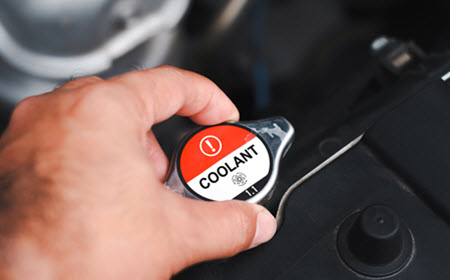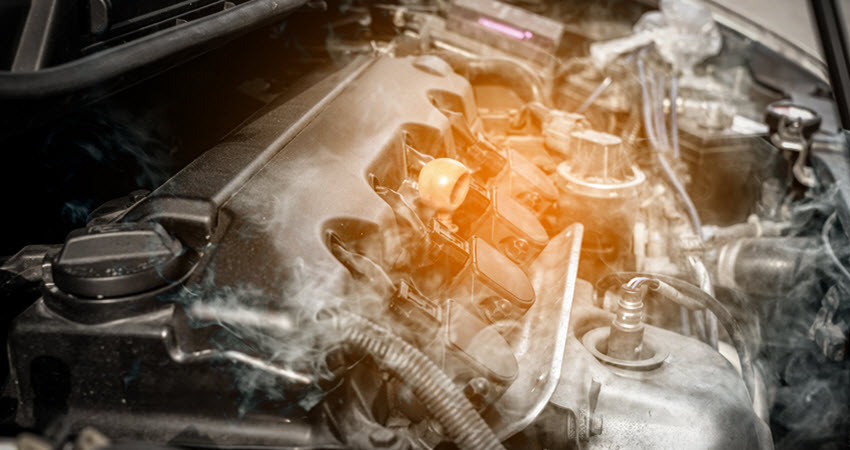The cooling system inside your BMW uses a coolant that is usually a mix of antifreeze and water to circulate and absorb the surplus heat from the engine. The coolant is moved from the engine into the radiator to then cool the coolant. Once the coolant is properly cooled down, it is then returned to the engine to start the cycle all over again.
When the cooling system in your BMW starts to have problems, it is often because of issues with the coolant hoses, water pump, radiator, or thermostat. If these issues aren’t addressed in a timely manner, then it can potentially cause engine damage.
Warning Signs Your BMW’s Cooling System Is Failing—Don’t Ignore Them!
A cooling system in a BMW will usually show signs or symptoms of there being issues. Whether it’s puddles of liquid forming under your vehicle, cold air even when you set the temperature to warm, or a bubbling sound coming from your engine. These signs below are strong indicators that something is going on with your car’s cooling system.
- Overheating engine: Temperature gauge rising into the red zone or overheating warning light on.
- Coolant leaks: Puddles under the car or a sweet smell.
- Low coolant levels: Frequent topping off of coolant.
- Strange engine noises: Whining, bubbling, or rumbling sounds.
- Steam or smoke from the hood: Critical warning sign of overheating.
- Faulty heater performance: Cold air even when set to warm.
11 Common BMW Cooling System Failures That Cause Overheating
Unfortunately, when the cooling system in your BMW starts to have issues, there are a lot of different causes. However, our skilled technicians are certified in BMW repair, so with factory-grade tools, they can repair or replace what is necessary to make the fix.
- Water pump malfunction: Prevents proper coolant circulation.
- Clogged radiator or hoses: Reduce coolant flow and heat dissipation.
- Faulty cooling fan: Can’t effectively cool the engine.
- Damaged head gasket: Leads to a variety of issues, including overheating.
- Aged or ineffective coolant: Reduces the cooling system’s efficiency.
- Wrong type of coolant: Can cause corrosion and damage.
- Coolant reservoir cap failure: Leads to pressure loss and potential overheating.
- Heater core issues: Can prevent proper heat circulation.
- Low Coolant Levels: Low coolant can be caused by leaks, evaporation, or a faulty expansion tank, all leading to overheating.
- Coolant Leaks: Leaks can originate from the radiator, hoses, water pump, or other components, causing coolant loss and potential overheating.
- Overheating: This can be caused by a failing thermostat (preventing proper coolant circulation), a faulty radiator (unable to dissipate heat), or low coolant levels.
BMW Cooling System Problems? Expert Diagnosis, Repairs, and Maintenance Tips to Prevent Overheating
When the cooling system of your BMW is having issues, it tends to lead to your engine overheating or can even cause serious engine damage. It’s important to get routine maintenance done to help the cooling system from failing. It’s also crucial to get your BMW checked out at our shop if you are having issues with the cooling system. Why wait and risk your safety and potentially have to spend more when you do get repairs done?
Diagnosing the Issue
- Check The Coolant Level: Ensure the coolant level in the overflow tank is within the “min” and “max” markings.
- Inspect for Leaks: Look for visible leaks around hoses, clamps, the radiator, the water pump, and other components.
- Monitor Engine Temperature: If the engine is overheating, discover the cause (e.g., faulty thermostat, water pump, or radiator).
- Perform a Pressure Test: A pressure test can help detect hidden leaks within the cooling system.
- Check for Any Air Bubbles: If the coolant level drops quickly after refilling, air bubbles could be trapped inside the system.
Common Problems and Solutions
Coolant Leaks
- Replace The Leaking Hoses: Look for any cracks, wear, or damage in the hoses and replace them if it is needed.
- Tighten or Replace Clamps: Ensure that clamps are correctly tightened or replaced if they are loose or damaged.
- Repair or Replace Cooling System Components: Replace any faulty water pumps, thermostats, or cracked coolant reservoirs affecting the cooling system.
Overheating
- Replace the Faulty Thermostat: A faulty thermostat may be preventing the engine from reaching optimal operating temperature.
- Check the Water Pump: A failing water pump can prevent coolant from circulating properly.
- Inspect Radiator: A damaged or clogged radiator can also cause overheating.
Low Coolant Levels
- Fill to the Recommended Level: Ensure the coolant level is within the “min” and “max” markings in the overflow tank.
- Refill and Bleed: After repairs or coolant changes, refill the system and bleed it to remove air bubbles. Air bubbles will affect how coolant circulates in the system.
Air in the System
- Bleed the Cooling System: This involves the removing of air bubbles that may be trapped in the system, potentially using a bleeder screw. This will ensure that the coolant can circulate properly through the cooling system.
Coolant Light On
- Check Your Coolant Level: A low coolant level can trigger the overheating or low coolant warning light.
- Check for Coolant Leaks: Ensure that there are no coolant leaks in the system.
- Check the Coolant Sensor: A faulty sensor might be causing the light to stay on.
Preventive Maintenance
- Change Coolant Regularly: Follow BMW’s recommended coolant change intervals, which are usually every 2-3 years or as specified in the owner’s manual.
- Inspect Hoses and Belts: Regularly have hoses and belts inspected for wear and damage.
- Flush the Cooling System: Periodically flush the cooling system to remove contaminants and debris.
At Bay Diagnostic, we have been  servicing drivers in Brooklyn for more than 40 years. We have a team of certified technicians that specialize in European auto maintenance and repair. With the latest diagnostic equipment, our team can figure out what is going on with the cooling system of your BMW and discover why it is having issues. We are located in Brooklyn and serve the nearby areas:
servicing drivers in Brooklyn for more than 40 years. We have a team of certified technicians that specialize in European auto maintenance and repair. With the latest diagnostic equipment, our team can figure out what is going on with the cooling system of your BMW and discover why it is having issues. We are located in Brooklyn and serve the nearby areas:
- Manhattan, NY
- Staten Island, NY
- Jamaica, NY
- Breezy Point, NY
- Queens, NY
To schedule an appointment, stop by our location in Brooklyn today to get your BMW’s cooling system checked out if it’s having issues. You can also book an appointment with us by calling 718-615-0705.

 1717 Gravesend Neck Road,
1717 Gravesend Neck Road,



